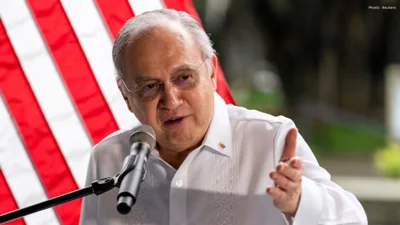
Post by : Sami Jeet
In recent years, pharmaceutical advances originally intended to treat type 2 diabetes have begun to influence far more than clinical care. Medications like Ozempic, Wegovy and Mounjaro—classified as GLP-1 receptor agonists—are altering appetite, body composition and consumer priorities, producing effects that ripple through food, fitness and travel markets worldwide.
These therapies are changing demand dynamics: people report eating less, choosing different foods, and reallocating spending toward wellness. As these consumption patterns consolidate, businesses and policymakers will need to reassess product offers, service models and long-term planning to meet new health-focused expectations.
The most immediate commercial impact is visible across the food sector. Individuals using GLP-1 drugs frequently report reduced appetite and a tendency toward smaller meals, pressuring restaurants, packaged-food firms and retailers to rethink portioning and product design.
Full-service restaurants are adapting by emphasizing concentrated flavours and ingredient quality over sheer volume. Fine-dining establishments in global hubs are experimenting with shorter tasting menus and curated multi-course experiences that prioritise nutritional balance rather than abundance.
Quick-service operators are responding too, testing compact offerings, modular meals and tailored combos to align with lower-calorie preferences. There is increasing interest in protein-rich, low-carbohydrate options and modular servings that let customers downsize without feeling deprived.
In retail, manufacturers face similar pressures: processed snack lines may stagnate while demand grows for minimally processed, natural ingredients, portion-controlled packs and low-sugar beverages. Many companies are already evaluating reformulation and new SKUs to appeal to a more health-conscious buyer base.
Overall, the marketing playbook is shifting from size and indulgence to transparency, moderation and ingredient provenance.
For the fitness sector, the arrival of effective medical weight-loss tools changes the central value proposition. Exercise is increasingly framed not solely as a weight-loss mechanism but as a means to preserve muscle mass, support metabolic health and maintain functional capacity.
Programs emphasising strength training, mobility and recovery are gaining prominence, especially since rapid weight reduction can accelerate lean-mass loss. Trainers and studios are designing personalised regimens that prioritise long-term resilience over transient calorie deficits.
Wearables and remote monitoring technologies are becoming more relevant as consumers seek data on sleep, recovery and cardiovascular health in addition to steps and calories. Wellness retreats and clinics are evolving to offer integrated packages combining exercise, mental health support and nutritional planning tailored for medicated clients.
Communications from fitness influencers and brands are also shifting tone—focusing on sustainability, mental wellbeing and maintenance rather than purely aesthetic outcomes.
The travel industry is adapting to travellers who prioritise health outcomes alongside leisure. What was once niche wellness tourism is moving into mainstream hospitality offerings, with properties adding services that cater to reduced appetites and health-focused routines.
Hotels and resorts now commonly provide lighter, nutritionally balanced menus, nutritionist consultations and on-site fitness programming suited to diverse ability levels. In markets across the Middle East and beyond, operators are packaging restorative experiences—mindfulness sessions, plant-forward cuisine and tailored activity plans—that align with guests’ evolving priorities.
Airlines and cruise lines are also reviewing onboard food offerings and in-destination itineraries, incorporating healthier meal choices and dedicated wellness spaces so travellers can maintain routines while away from home.
Luxury brands are reframing travel as a transformative, health-supporting pursuit rather than an exercise in pure indulgence.
Widespread uptake of these medications prompts broader economic questions. Reduced caloric consumption may affect commodity demand for sugar and highly processed grains, while boosting markets for organic, plant-based and fortified foods.
Retailers that previously relied on impulse-food sales are diversifying into wellness categories—vitamins, protein supplements and portion-controlled meal solutions. Pharmacies and health retailers are expanding assortments to include fitness accessories and health-oriented convenience foods.
Marketing strategies will continue to evolve, emphasising health, transparency and long-term wellbeing over fleeting indulgence—a shift that affects advertising, product placement and brand partnerships across sectors.
The uptake of effective weight-loss drugs also has social ramifications. For many users, improved weight control brings greater confidence and energy; for societies, it raises questions about aesthetics, access and expectations around self-management.
Mental health professionals warn that medication-assisted weight loss should be paired with psychological support to prevent unhealthy maintenance pressures. As a result, more programs are integrating mindful-eating education, counselling and behavioural coaching as standard practice.
At the same time, the perception of personalised health services as a luxury is shifting, with technology and scaled service models making tailored wellness more broadly accessible.
The expansion of GLP-1 therapies signals a structural shift in consumer behaviour that will persist as treatments become more available. Food producers, fitness providers and travel operators that align products and services to support balanced, long-term wellbeing will be best positioned in the coming decade.
Experts stress these drugs are a tool, not a panacea: sustainable benefit depends on nutrition, physical activity and psychological support. Companies that recognise this intersection—between medical innovation, lifestyle practice and cultural values—stand to define the next wave of offerings in a health-centred economy.
In sum, the integration of medical weight-loss into everyday life is prompting businesses and policymakers to rethink demand models and service design, steering markets toward moderation, resilience and measurable wellbeing.










Mattel Revives Masters of the Universe Action Figures Ahead of Film Launch
Mattel is reintroducing Masters of the Universe figures in line with its upcoming film, tapping into

China Executes 11 Members of Criminal Clan Linked to Myanmar Scam
China has executed 11 criminals associated with the Ming family, known for major scams and human tra

US Issues Alarm to Iran as Military Forces Deploy in Gulf Region
With a significant military presence in the Gulf, Trump urges Iran to negotiate a nuclear deal or fa

Copper Prices Reach Unprecedented Highs Amid Geopolitical Turmoil
Copper prices soar to all-time highs as geopolitical tensions and a weakening dollar boost investor

New Zealand Secures First Win Against India, Triumph by 50 Runs
New Zealand won the 4th T20I against India by 50 runs in Vizag. Despite Dube's impressive 65, India